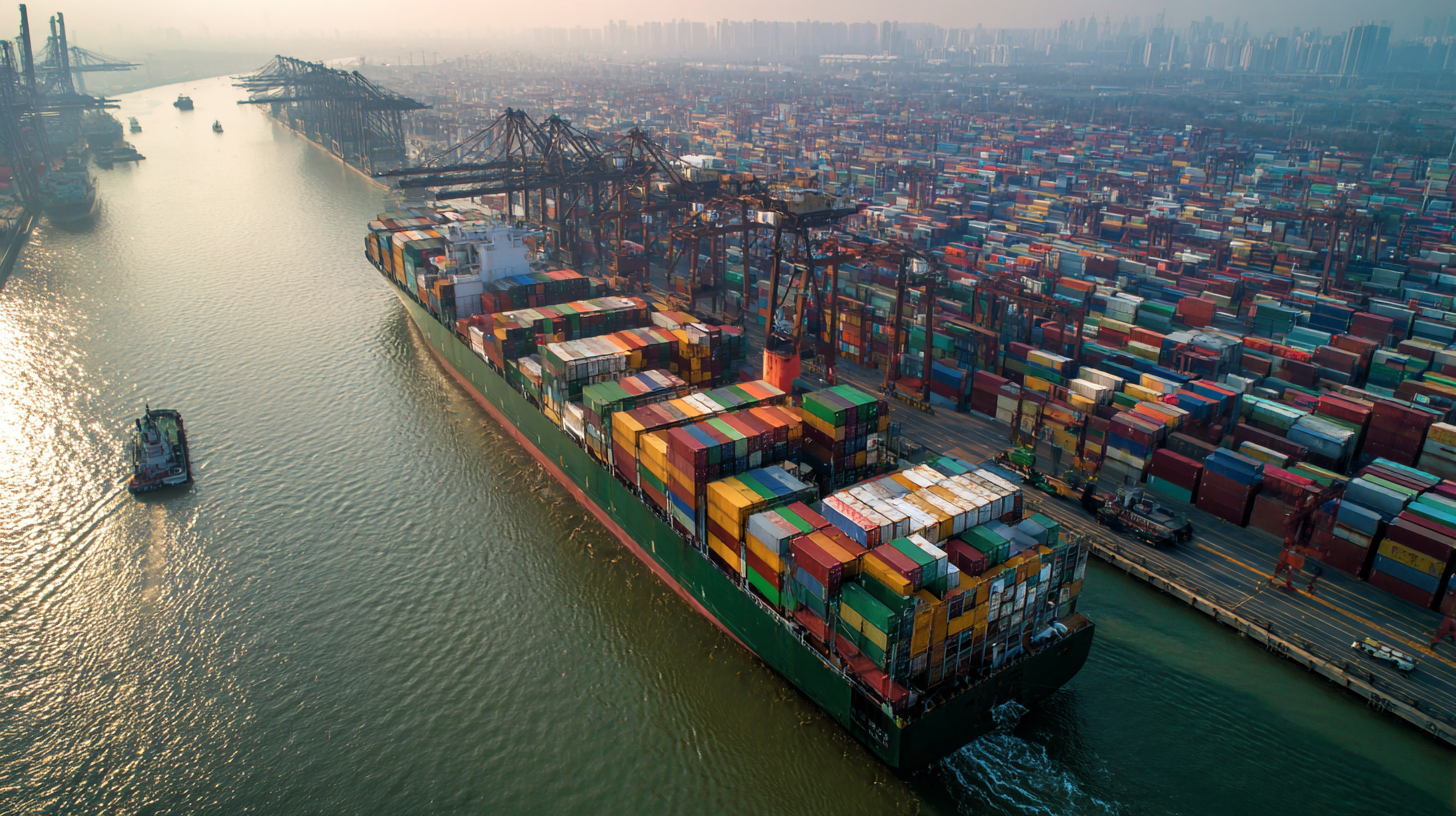As global trade continues to evolve, the emphasis on sustainability and eco-friendly practices within supply chains cannot be overstated. In this context, Green Energy products have emerged as critical components for businesses striving to meet regulatory requirements and consumer demand for environmentally responsible solutions. The integration of global trade certifications plays a pivotal role in ensuring that these products are not only effective but also adhere to the highest standards of sustainability and efficiency.

With the impending technological trends outlined for the industry by 2025, companies must navigate an increasingly complex landscape of certifications and compliance to harness the full potential of Green Energy. This blog will explore the essential certifications, their impact on supply chain management, and strategies for successfully incorporating best practices in the pursuit of a greener future.
In today’s competitive landscape, selecting the right green energy certifications for your supply chain is paramount for businesses aiming to enhance their sustainability credentials. As organizations like semiconductor manufacturers refine their supplier selection criteria to include carbon reduction performance, it becomes increasingly important for suppliers to obtain credible green certifications. By integrating these certifications into their operations, companies can demonstrate their commitment to environmental stewardship and align with industry leaders that strive for net-zero emissions by 2050.

Recent research indicates that at least 50% of customers can now purchase renewable electricity directly from their suppliers, highlighting a growing trend in consumer demand for sustainable energy solutions. Moreover, the rise of tradable green certificates serves as a pathway for businesses to empower their energy supply chains. These instruments not only facilitate the generation of renewable energy but also bolster corporate reputations by showcasing compliance with stringent environmental standards.
Notably, significant investments in green initiatives are being driven by an evolving understanding of responsible sourcing and a commitment to environmental impact reduction among major companies. This shift towards demanding verifiable green energy solutions underscores the necessity for organizations to carefully navigate the landscape of green energy certifications within their supply chains.
In today's interconnected world, understanding the importance of sustainable practices in global trade is paramount for businesses aiming to thrive. As consumers increasingly demand eco-friendly products, companies must align their supply chains with green energy certifications to meet these expectations. Adopting sustainable practices not only enhances a company’s brand image but also fosters trust among consumers who prioritize environmental responsibility.
Moreover, integrating sustainability into global trade can lead to long-term economic benefits. By sourcing best green energy products, companies can reduce waste, optimize resource use, and lower operational costs. Certifications in sustainability serve as a benchmark, ensuring that the products meet defined environmental standards, which in turn can attract environmentally-conscious consumers. This commitment to sustainable practices empowers businesses to not only comply with regulations but also to lead the charge towards a more sustainable future in global commerce.
In the quest for sustainable supply chains, evaluating the quality and compliance of green products emerges as a critical factor. As industries such as medical devices face significant pressures yet uncover new growth opportunities, companies must navigate an increasingly complex landscape of global trade certifications. Ensuring that products meet rigorous environmental standards not only enhances brand reputation but also aligns with regulatory requirements. Stakeholders must prioritize certifications that reflect the true environmental impact of these products, addressing the demand for transparency and accountability in sourcing.
Furthermore, as the automotive sector undergoes transformative shifts driven by electrification and technological advancements, optimizing supply chain management becomes paramount. The acceleration of innovation necessitates that businesses integrate green energy products seamlessly into their operations. By doing so, they can mitigate risks associated with fluctuations in market demand and adapt to evolving consumer preferences. Emphasizing sustainable sourcing practices ultimately fosters resilience, allowing companies to thrive amidst challenges while contributing to the broader goal of a greener economy.
| Certification Type | Description | Importance in Supply Chain | Compliance Requirements | Renewal Period |
|---|---|---|---|---|
| ISO 14001 | Environmental Management Standards | Ensures minimal environmental impact. | Regular audits and documentation reviews. | Every 3 years |
| LEED | Leadership in Energy and Environmental Design | Promotes sustainable building practices. | Compliance with design and construction standards. | Every 5 years |
| Energy Star | Certification for energy-efficient products | Indicates energy savings and environmental sustainability. | Manufacturer must meet energy efficiency criteria. | No fixed term but must be re-evaluated. |
| B Corp Certification | Social and environmental performance standards | Demonstrates commitment to high social responsibility. | Performance assessment and transparency requirements. | Every 3 years |
| FSC Certification | Forest Stewardship Council certification for wood products | Confirms sustainable forestry practices. | Chain of custody audits and compliance tracking. | Every 5 years |
Integrating certified green energy products into your supply chain is essential for companies striving for sustainability and compliance with global trade standards. To begin with, it is crucial to identify the certifications that best align with your organization's values and the products you intend to use. Look for reputable certifications such as Energy Star, LEED, or ISO 14001 which not only highlight eco-friendliness but also signify a commitment to minimizing environmental impact. Engaging with suppliers who possess these certifications can enhance your overall supply chain reliability while promoting a green image.
Once potential suppliers are identified, developing a thorough evaluation process is vital. This might include setting up regular audits and assessments to ensure compliance with sustainability goals and quality standards. Establish strong communication channels with suppliers to foster transparency about their certification processes and product sourcing. Additionally, consider incorporating these products into your marketing strategy to showcase your commitment to sustainability, which can improve brand reputation and attract environmentally conscious consumers. By following these strategies, businesses can successfully weave certified green products into their supply chains, maximizing both environmental and economic benefits.
This bar chart illustrates the percentage of certified green energy products in different categories within the supply chain. The data reflects current trends in global trade certifications that prioritize sustainable practices.
Building partnerships with reliable manufacturers is crucial for enhancing green energy solutions in today's supply chain. As businesses increasingly pivot towards sustainability, aligning with manufacturers that prioritize eco-friendly practices ensures that the products sourced are not only effective but also contribute to global decarbonization efforts. Companies like zolar exemplify this approach by simplifying the process for homeowners to harness solar energy, thus empowering individuals to participate in the clean energy transition.
Tips for finding trustworthy manufacturers include conducting thorough research into their sustainability certifications and practices. Look for manufacturers that engage in transparent supply chain management and actively demonstrate commitment to renewable energy initiatives. Building a strong network with manufacturers that prioritize clean technologies will facilitate access to innovative solutions that are both reliable and scalable. Engaging with partners committed to environmental responsibility not only strengthens your supply chain but also enhances your brand's commitment to a greener future.
Moreover, attending industry events, such as energy summits, can provide valuable insights and connections with key players in the clean energy sector. Networking with experts and learning about advanced technologies can lead to fruitful collaborations, ensuring that your supply chain is equipped to meet increasing energy demands sustainably.
